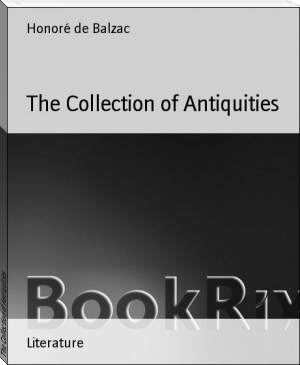The Collection of Antiquities - Honoré de Balzac (love books to read .TXT) 📗

- Author: Honoré de Balzac
Book online «The Collection of Antiquities - Honoré de Balzac (love books to read .TXT) 📗». Author Honoré de Balzac
The first winter went by. The Count had drawn on M. Cardot for the trifling sum of thirty thousand francs over and above Chesnel's remittance. As Cardot very carefully refrained from using his right of remonstrance, Victurnien now learned for the first time that he had overdrawn his account. He was the more offended by an extremely polite refusal to make any further advance, since it so happened that he had just lost six thousand francs at play at the club, and he could not very well show himself there until they were paid.
After growing indignant with Maitre Cardot, who had trusted him with thirty thousand francs (Cardot had written to Chesnel, but to the fair Duchess' favorite he made the most of his so-called confidence in him), after all this, d'Esgrignon was obliged to ask the lawyer to tell him how to set about raising the money, since debts of honor were in question.
"Draw bills on your father's banker, and take them to his correspondent; he, no doubt, will discount them for you. Then write to your family, and tell them to remit the amount to the banker."
An inner voice seemed to suggest du Croisier's name in this predicament. He had seen du Croisier on his knees to the aristocracy, and of the man's real disposition he was entirely ignorant. So to du Croisier he wrote a very offhand letter, informing him that he had drawn a bill of exchange on him for ten thousand francs, adding that the amount would be repaid on receipt of the letter either by M. Chesnel or by Mlle. Armande d'Esgrignon. Then he indited two touching epistles--one to Chesnel, another to his aunt. In the matter of going headlong to ruin, a young man often shows singular ingenuity and ability, and fortune favors him. In the morning Victurnien happened on the name of the Paris bankers in correspondence with du Croisier, and de Marsay furnished him with the Kellers' address. De Marsay knew everything in Paris. The Kellers took the bill and gave him the sum without a word, after deducting the discount. The balance of the account was in du Croisier's favor.
But the gaming debt was as nothing in comparison with the state of things at home. Invoices showered in upon Victurnien.
"I say! Do you trouble yourself about that sort of thing?" Rastignac said, laughing. "Are you putting them in order, my dear boy? I did not think you were so business-like."
"My dear fellow, it is quite time I thought about it; there are twenty odd thousand francs there."
De Marsay, coming in to look up d'Esgrignon for a steeplechase, produced a dainty little pocket-book, took out twenty thousand francs, and handed them to him.
"It is the best way of keeping the money safe," said he; "I am twice enchanted to have won it yesterday from my honored father, Milord Dudley."
Such French grace completely fascinated d'Esgrignon; he took it for friendship; and as to the money, punctually forgot to pay his debts with it, and spent it on his pleasures. The fact was that de Marsay was looking on with an unspeakable pleasure while young d'Esgrignon "got out of his depth," in dandy's idiom; it pleased de Marsay in all sorts of fondling ways to lay an arm on the lad's shoulder; by and by he should feel its weight, and disappear the sooner. For de Marsay was jealous; the Duchess flaunted her love affair; she was not at home to other visitors when d'Esgrignon was with her. And besides, de Marsay was one of those savage humorists who delight in mischief, as Turkish women in the bath. So when he had carried off the prize, and bets were settled at the tavern where they breakfasted, and a bottle or two of good wine had appeared, de Marsay turned to d'Esgrignon with a laugh:
"Those bills that you are worrying over are not yours, I am sure."
"Eh! if they weren't, why should he worry himself?" asked Rastignac.
"And whose should they be?" d'Esgrignon inquired.
"Then you do not know the Duchess' position?" queried de Marsay, as he sprang into the saddle.
"No," said d'Esgrignon, his curiosity aroused.
"Well, dear fellow, it is like this," returned de Marsay--"thirty thousand francs to Victorine, eighteen thousand francs to Houbigaut, lesser amounts to Herbault, Nattier, Nourtier, and those Latour people,--altogether a hundred thousand francs."
"An angel!" cried d'Esgrignon, with eyes uplifted to heaven.
"This is the bill for her wings," Rastignac cried facetiously.
"She owes all that, my dear boy," continued de Marsay, "precisely because she is an angel. But we have all seen angels in this position," he added, glancing at Rastignac; "there is this about women that is sublime: they understand nothing of money; they do not meddle with it, it is no affair of theirs; they are invited guests at the 'banquet of life,' as some poet or other said that came to an end in the workhouse."
"How do you know this when I do not?" d'Esgrignon artlessly returned.
"You are sure to be the last to know it, just as she is sure to be the last to hear that you are in debt."
"I thought she had a hundred thousand livres a year," said d'Esgrignon.
"Her husband," replied de Marsay, "lives apart from her. He stays with his regiment and practises economy, for he has one or two little debts of his own as well, has our dear Duke. Where do you come from? Just learn to do as we do and keep our friends' accounts for them. Mlle. Diane (I fell in love with her for the name's sake), Mlle. Diane d'Uxelles brought her husband sixty thousand livres of income; for the last eight years she has lived as if she had two hundred thousand. It is perfectly plain that at this moment her lands are mortgaged up to their full value; some fine morning the crash must come, and the angel will be put to flight by--must it be said?--by sheriff's officers that have the effrontery to lay hands on an angel just as they might take hold of one of us."
"Poor angel!"
"Lord! it costs a great deal to dwell in a Parisian heaven; you must whiten your wings and your complexion every morning," said Rastignac.
Now as the thought of confessing his debts to his beloved Diane had passed through d'Esgrignon's mind, something like a shudder ran through him when he remembered that he still owed sixty thousand francs, to say nothing of bills to come for another ten thousand. He went back melancholy enough. His friends remarked his ill-disguised preoccupation, and spoke of it among themselves at dinner.
"Young d'Esgrignon is getting out of his depth. He is not up to Paris. He will blow his brains out. A little fool!" and so on and so on.
D'Esgrignon, however, promptly took comfort. His servant brought him two letters. The first was from Chesnel. A letter from Chesnel smacked of the stale grumbling faithfulness of honesty and its consecrated formulas. With all respect he put it aside till the evening. But the second letter he read with unspeakable pleasure. In Ciceronian phrases, du Croisier groveled before him, like a Sganarelle before a Geronte, begging the young Count in future to spare him the affront of first depositing the amount of the bills which he should condescend to draw. The concluding phrase seemed meant to convey the idea that here was an open cashbox full of coin at the service of the noble d'Esgrignon family. So strong was the impression that Victurnien, like Sganarelle or Mascarille in the play, like everybody else who feels a twinge of conscience at his finger-tips, made an involuntary gesture.
Now that he was sure of unlimited credit with the Kellers, he opened Chesnel's letter gaily. He had expected four full pages, full of expostulation to the brim; he glanced down the sheet for the familiar words "prudence," "honor," "determination to do right," and the like, and saw something else instead which made his head swim.
"MONSIEUR LE COMTE,--Of all my fortune I have now but two hundred
thousand francs left. I beg of you not to exceed that amount, if
you should do one of the most devoted servants of your family the
honor of taking it. I present my respects to you.
"CHESNEL."
"He is one of Plutarch's men," Victurnien said to himself, as he tossed the letter on the table. He felt chagrined; such magnanimity made him feel very small.
"There! one must reform," he thought; and instead of going to a restaurant and spending fifty or sixty francs over his dinner, he retrenched by dining with the Duchesse de Maufrigneuse, and told her about the letter.
"I should like to see that man," she said, letting her eyes shine like two fixed stars.
"What would you do?"
"Why, he should manage my affairs for me."
Diane de Maufrigneuse was divinely dressed; she meant her toilet to do honor to Victurnien. The levity with which she treated his affairs or, more properly speaking, his debts fascinated him.
The charming pair went to the Italiens. Never had that beautiful and enchanting woman looked more seraphic, more ethereal. Nobody in the house could have believed that she had debts which reached the sum total mentioned by de Marsay that very morning. No single one of the cares of earth had touched that sublime forehead of hers, full of woman's pride of the highest kind. In her, a pensive air seemed to be some gleam of an earthly love, nobly extinguished. The men for the most part were wagering that Victurnien, with his handsome figure, laid her under contribution; while the women, sure of their rival's subterfuge, admired her as Michael Angelo admired Raphael, in petto. Victurnien loved Diane, according to one of these ladies, for the sake of her hair--she had the most beautiful fair hair in France; another maintained that Diane's pallor was her principal merit, for she was not really well shaped, her dress made the most of her figure; yet others thought that Victurnien loved her for her foot, her one good point, for she had a flat figure. But (and this brings the present-day manner of Paris before you in an astonishing manner) whereas all the men said that the Duchess was subsidizing Victurnien's splendor, the women, on the other hand, gave people to understand that it was Victurnien who paid for the angel's wings, as Rastignac said.
As they drove back again, Victurnien had it on the tip of his tongue a score of times to open this chapter, for the Duchess' debts weighed more heavily upon his mind than his own; and a score of times his purpose died away before the attitude of the divine creature





Comments (0)